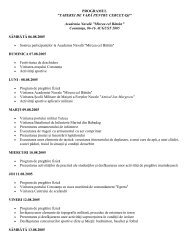Create successful ePaper yourself
Turn your PDF publications into a flip-book with our unique Google optimized e-Paper software.
1 The term Pontus means the open and far stretching<br />
<strong>sea</strong>: Hom.Il. VI 29, Hom. Od. III 158. Pontus<br />
(meaning Euxinus): Herod. VII 147, Aesch. Pers. 878,<br />
Aristoph. Vesp. 700. Euxinus Pontus: Herod. I 6, Thuc.<br />
II 96, Eur. Iph. Taur. 123.<br />
2 For a detailed account of the Argo Expedition<br />
see: Pind. Pyth. 4,117-187, Schol. Apoll. Rhod, Arg. 1,<br />
20 sqq. Apollod. 1,111-113. Also see: K. Meuli, Od.<br />
und Argonautika, Berlin 1921, I.R. Bacon, The Voyage<br />
of the Argonauts, Methuen 1925, R. Roux, Le<br />
problème des Argonautes, Paris 1949, H.V. Geisau,<br />
Argonautai (Áñãïíáýôáé), LA 1 (1979) 537-539. Ðñâë:<br />
M. -M. Simpsas, The Navy in Greek History, I (in<br />
Greek), published by the Hellenic Navy General Staff,<br />
Athens 1982, 45-47.<br />
3 Strab, Geogr. 7 3,18.<br />
4 S. E. Lykoudes, The Euxine (Åýîåéíïò Ðüíôïò),<br />
MEE 11 (1929) 756.<br />
5 Hom. Od. ×É 15 - 16. As Strabo (7 3,8) states,<br />
Apollodorous accuses Homer of presenting false evidence<br />
as true due to ignoring the actual elements of<br />
the geography of the Euxine.<br />
6 Strab. 7 1,1 The maximum length of the Euxine<br />
is 980 klm and its maximum width between Herakleia<br />
and the mouths of the river Hypanis is 530 klm. See:<br />
Chr. Danoff, Pontos Euxeinos, LA 4 (1979) 1051. More<br />
about Euxine see idem, Pontos Euxeinos, RE Suppl.<br />
IX 866-1175.<br />
6a B.W. Labaree, How the Greeks sailed into the<br />
Black Sea, AJA 61 (1957) 29 sqq.<br />
7 Apollod. De navium, II (= Strabo 7 3,7). E.H.<br />
Minns, Scythians and the Greeks, Cambridge, 1913.<br />
8 Dion. Perieg. l. 146, Scymn. Ch. Peripl. l. 734,<br />
Eust. Parecb. in Dion. Per. l. 146.<br />
9 Scymn. Ch. Per. l. 733.<br />
10 2 J. Berard, La colonisation grecque, Paris 1957 .<br />
Also R. Drews, The Erliest Greek Settlements on the<br />
Black Sea, JHS 96 (1976) 18-31.<br />
11 Chrys. P. Kardara, Introduction into Ancient<br />
History. The creation and development of Greek Cities<br />
(1200 – 500 BC) (in Greek, ÅéóáãùãÞ åéò ôçí<br />
Áñ÷áßáí Éóôïñßáí. Äçìéïõñãßá êáé áíÜðôõîéò ôùí<br />
åëëçíéêþí ðüëåùí 1200-500 ð.×.), Athens 1981, 104.<br />
For a very detailed account of the relevant elements<br />
see El. K. Petropoulos, Ancient greek Colonies in the<br />
Black Sea, I – II, BAR, Oxford 2007.<br />
12 Markedly, Constantine Paparrigopoulos in his classic<br />
work “History of the Greek Nation” «Éóôïñßá ôïõ<br />
Åëëçíéêïý ¸èíïõò», I, Athens 19255 , 521 classifies the<br />
Euxine colonies as ‘Milesian Institutions (Colonies)’.<br />
12a T. S. Noonan, The grain Trade of the Northern<br />
Black Sea in Antiquity, AJPh 94 (1973) 231-242.<br />
13 Michael Sakellariou, The prosperity of Ancient<br />
Greeks (in Greek, Ç áêìÞ ôïõ Áñ÷áúêïý Åëëçíéóìïý),<br />
IEE, II, Athens 1971, 244-245 and 275. About<br />
Cimmerians see: Ann Kammenhuber, Kimmerier, LA<br />
3 (1979) 210-211.<br />
13a El. K. Petropoulos, Aspects of the Early History<br />
of the Euxine (in Greek, ÌåñéêÝò ðôõ÷Ýò ôçò<br />
ðñþéìçò éóôïñßáò ôïõ Åõîåßíïõ Ðüíôïõ), journal<br />
«Áñ÷áéïëïãßá» 76 (2000) 61-64.<br />
14 D. A. Zakythinos, History of the Byzantium (324<br />
– 1071) (in Greek, ÂõæáíôéíÞ Éóôïñßá (324 – 1071)),<br />
Athens 1972, 73.<br />
15 K. Karapli, Daras, a city-fort in Upper Mesopotamia<br />
(6 th – 11 th century) (in Greek, ÄÜñáò, ìéá ðüëç<br />
– öñïýñéï óôçí ¢íù Ìåóïðïôáìßá (6 ïò – 11 ïò áé.),<br />
Kletorion, in memory of N. Oikonomides, Athens –<br />
Thessalonica 2006, 147-8.<br />
16 J. – R. Palanque, La préfecture du prétoire de l’<br />
Illyricum au IV e siècle, Byz. 21 (1951) 5 sqq.<br />
17 Ibid, Zakythinos, 96.<br />
18 Concerning the Slavic activity in connection to<br />
Istria based on the archaeological evidence see: E.<br />
Condurachi, Histria à l’ époque du Bas – Empire d’<br />
après les dernières fouilles archélogiques, Dacia (N.S.)<br />
1 (1957) 245 spp. Also see: Ion Nestor, L’ établissement<br />
des Slaves en Roumanie à la lumière de<br />
quelques découvertes archéologiques récentes, Dacia<br />
5 (1961) 429 sqq.<br />
19 Concerning the origin of the Bulgarians and their<br />
relationships with Byzantium and the Slavs see: Gy.<br />
Moravcsik, Byzantinoturcica, I, Berlin 1958 2 , 108 sqq.<br />
20 G. Ostrogorsky, Histoire de l’ état Byzantin,<br />
Paris 1956, 198. Also see: Kath. Christophilopoulou,<br />
Byzantine History (in Greek, ÂõæáíôéíÞ Éóôïñßá), II 1<br />
(610 – 867), Athens 1984 2 , 126 – 127.<br />
21 Christophilopoulou, op.cit., 166-177 and 180.<br />
22 Ostrogorsky, op.cit., 134.<br />
23 A. Pertusi, La formation des thèmes byzantins,<br />
Berichte zum XI. Internationalen Byzantinisten – congress<br />
München 1958, 26 sqq.<br />
24 The Byzantines, already from the time of<br />
Heraclius to reinforce the defence of the north shores<br />
of the Euxine formed an alliance with the nomadic<br />
race of the Khazars, that in time manage to establish<br />
a kingdom in the North of the Caucasus. Thanks to<br />
that alliance, the Empire managed to obstruct in the<br />
Arab’s expansionist aims and tendencies to the north<br />
coast of the Euxine through the Caucasus. Around<br />
the end of the VII th and the start of the VIII th century,<br />
the relations between Byzantium and the Khazars<br />
worsened because of their intentions to limit the<br />
Empire’s control over the Climates in Crimea. Since<br />
711 and thereafter the relations of the Byzantines<br />
with the Khazars improved again. See: Th. Nooman,<br />
Byzantium and Khazars : a special relationship? In the<br />
collection J. Shepard – S. Franklin (ed). Byzantine<br />
Diplomacy, Variorum Reprints 1992, 220-241.<br />
20 ����� Review of Military History �����

















